Analyzing Liberalism's Challenge to Societal Structures and Religion
VerifiedAdded on 2022/10/19
|5
|854
|285
Report
AI Summary
This integrative summary paper examines Francis Fukuyama's argument that liberalism has diminished the role of religion in Europe. It explores how liberalism, rooted in the principles of freedom of thought and expression as articulated by John Stuart Mill, challenges traditional societal structures. The paper analyzes liberalism's impact beyond religion, focusing on its critique of social hierarchies, particularly the class divisions highlighted by Karl Marx. By examining these perspectives, the paper argues that liberalism aims to dismantle differences and establish a unified system of governance, thereby challenging and reshaping established norms.
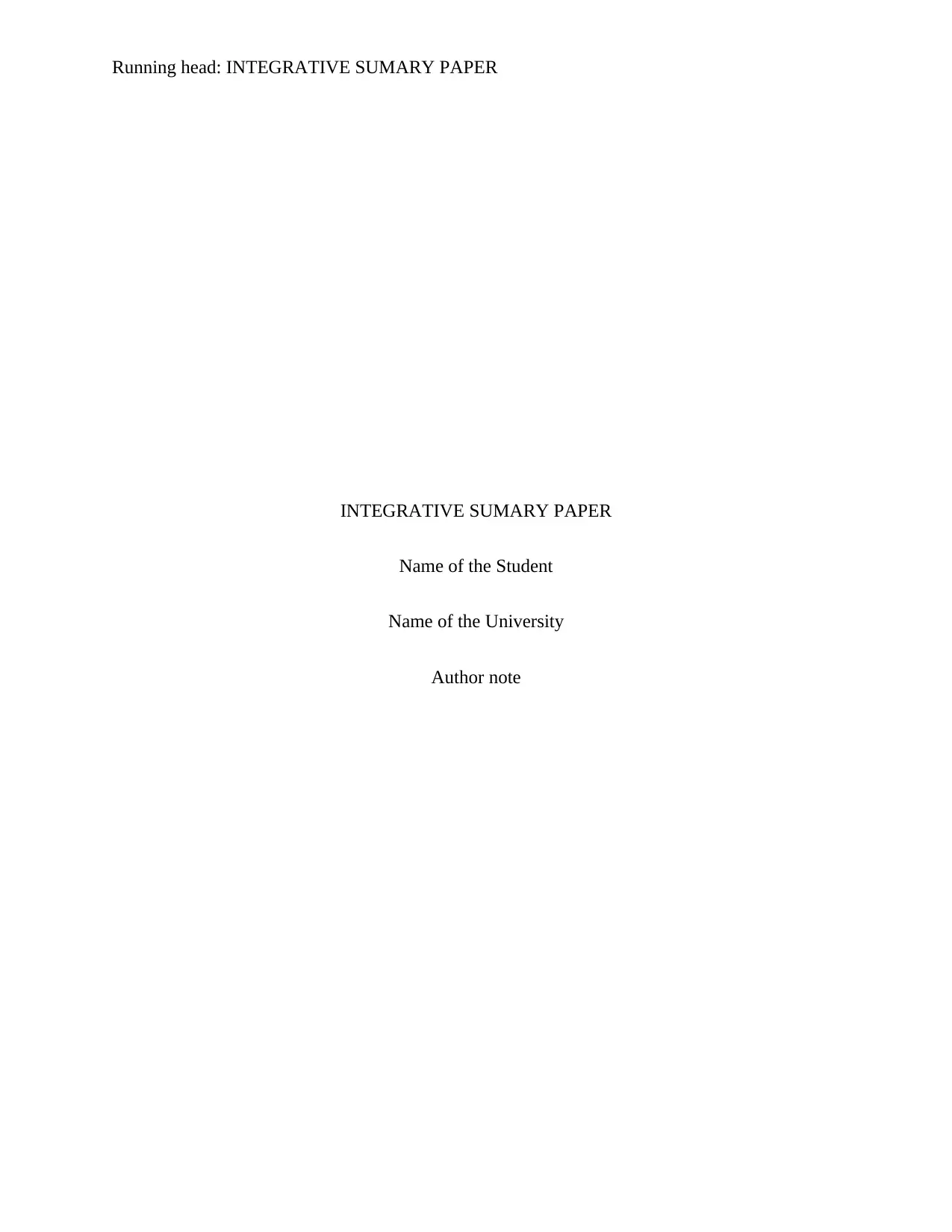
Running head: INTEGRATIVE SUMARY PAPER
INTEGRATIVE SUMARY PAPER
Name of the Student
Name of the University
Author note
INTEGRATIVE SUMARY PAPER
Name of the Student
Name of the University
Author note
Paraphrase This Document
Need a fresh take? Get an instant paraphrase of this document with our AI Paraphraser
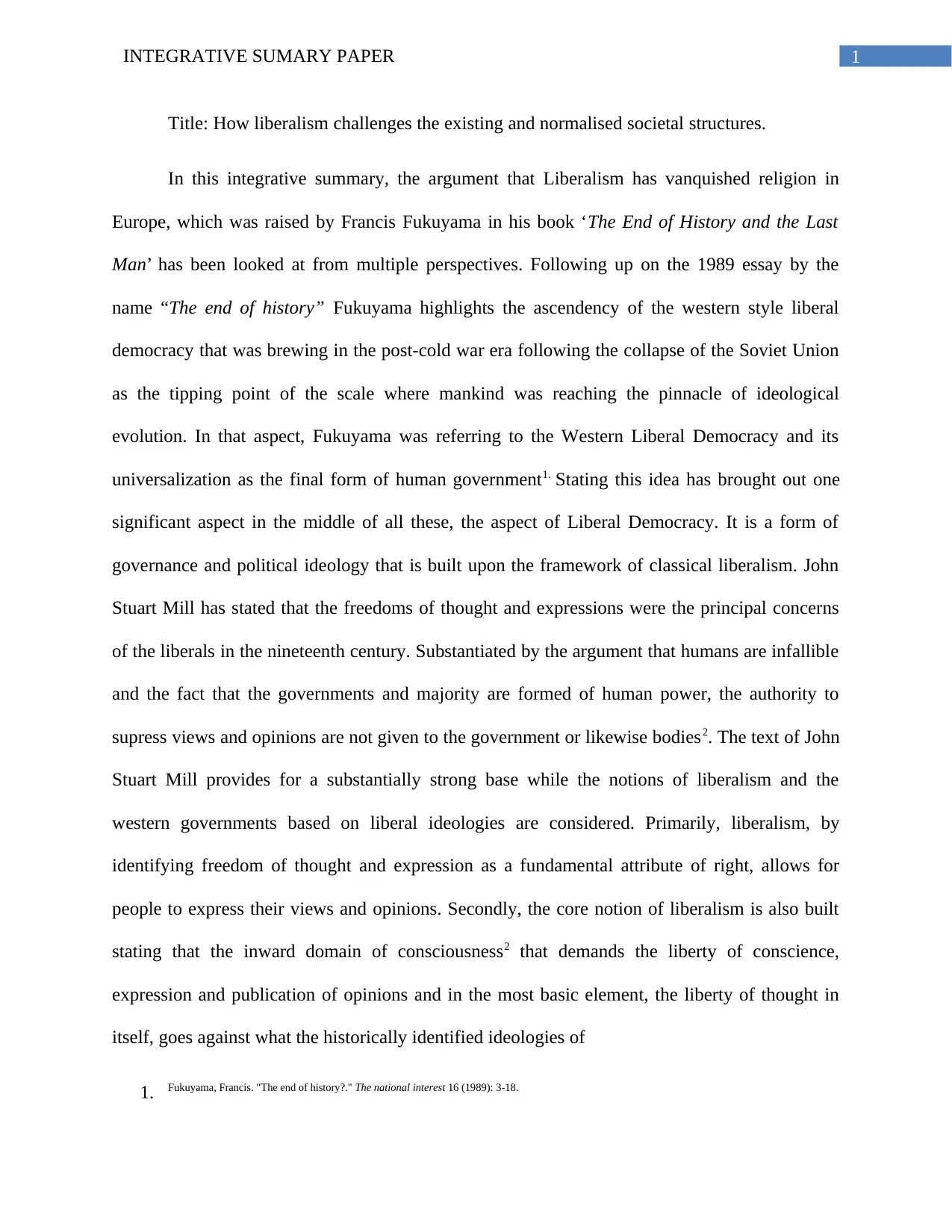
1INTEGRATIVE SUMARY PAPER
Title: How liberalism challenges the existing and normalised societal structures.
In this integrative summary, the argument that Liberalism has vanquished religion in
Europe, which was raised by Francis Fukuyama in his book ‘The End of History and the Last
Man’ has been looked at from multiple perspectives. Following up on the 1989 essay by the
name “The end of history” Fukuyama highlights the ascendency of the western style liberal
democracy that was brewing in the post-cold war era following the collapse of the Soviet Union
as the tipping point of the scale where mankind was reaching the pinnacle of ideological
evolution. In that aspect, Fukuyama was referring to the Western Liberal Democracy and its
universalization as the final form of human government1. Stating this idea has brought out one
significant aspect in the middle of all these, the aspect of Liberal Democracy. It is a form of
governance and political ideology that is built upon the framework of classical liberalism. John
Stuart Mill has stated that the freedoms of thought and expressions were the principal concerns
of the liberals in the nineteenth century. Substantiated by the argument that humans are infallible
and the fact that the governments and majority are formed of human power, the authority to
supress views and opinions are not given to the government or likewise bodies2. The text of John
Stuart Mill provides for a substantially strong base while the notions of liberalism and the
western governments based on liberal ideologies are considered. Primarily, liberalism, by
identifying freedom of thought and expression as a fundamental attribute of right, allows for
people to express their views and opinions. Secondly, the core notion of liberalism is also built
stating that the inward domain of consciousness2 that demands the liberty of conscience,
expression and publication of opinions and in the most basic element, the liberty of thought in
itself, goes against what the historically identified ideologies of
1. Fukuyama, Francis. "The end of history?." The national interest 16 (1989): 3-18.
Title: How liberalism challenges the existing and normalised societal structures.
In this integrative summary, the argument that Liberalism has vanquished religion in
Europe, which was raised by Francis Fukuyama in his book ‘The End of History and the Last
Man’ has been looked at from multiple perspectives. Following up on the 1989 essay by the
name “The end of history” Fukuyama highlights the ascendency of the western style liberal
democracy that was brewing in the post-cold war era following the collapse of the Soviet Union
as the tipping point of the scale where mankind was reaching the pinnacle of ideological
evolution. In that aspect, Fukuyama was referring to the Western Liberal Democracy and its
universalization as the final form of human government1. Stating this idea has brought out one
significant aspect in the middle of all these, the aspect of Liberal Democracy. It is a form of
governance and political ideology that is built upon the framework of classical liberalism. John
Stuart Mill has stated that the freedoms of thought and expressions were the principal concerns
of the liberals in the nineteenth century. Substantiated by the argument that humans are infallible
and the fact that the governments and majority are formed of human power, the authority to
supress views and opinions are not given to the government or likewise bodies2. The text of John
Stuart Mill provides for a substantially strong base while the notions of liberalism and the
western governments based on liberal ideologies are considered. Primarily, liberalism, by
identifying freedom of thought and expression as a fundamental attribute of right, allows for
people to express their views and opinions. Secondly, the core notion of liberalism is also built
stating that the inward domain of consciousness2 that demands the liberty of conscience,
expression and publication of opinions and in the most basic element, the liberty of thought in
itself, goes against what the historically identified ideologies of
1. Fukuyama, Francis. "The end of history?." The national interest 16 (1989): 3-18.
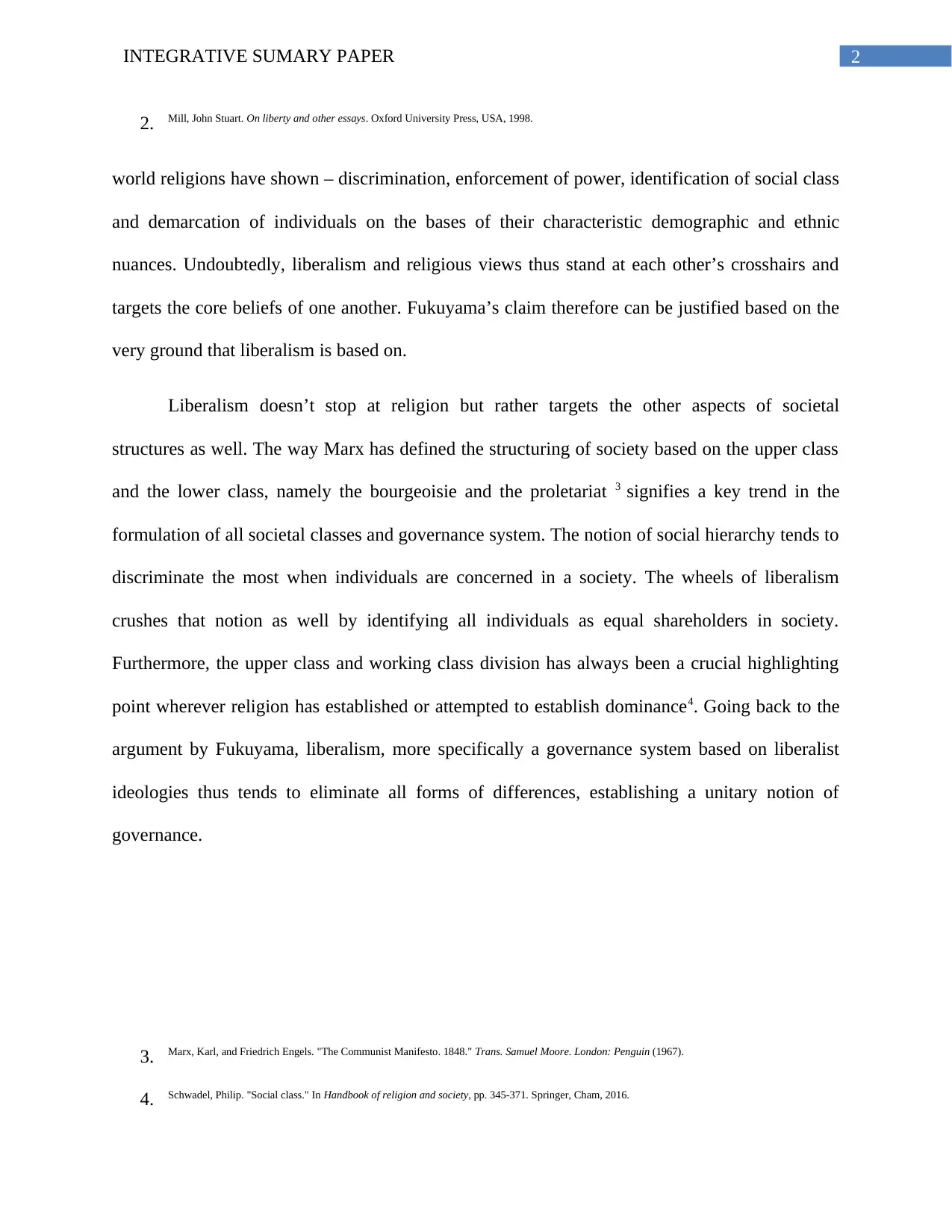
2INTEGRATIVE SUMARY PAPER
2. Mill, John Stuart. On liberty and other essays. Oxford University Press, USA, 1998.
world religions have shown – discrimination, enforcement of power, identification of social class
and demarcation of individuals on the bases of their characteristic demographic and ethnic
nuances. Undoubtedly, liberalism and religious views thus stand at each other’s crosshairs and
targets the core beliefs of one another. Fukuyama’s claim therefore can be justified based on the
very ground that liberalism is based on.
Liberalism doesn’t stop at religion but rather targets the other aspects of societal
structures as well. The way Marx has defined the structuring of society based on the upper class
and the lower class, namely the bourgeoisie and the proletariat 3 signifies a key trend in the
formulation of all societal classes and governance system. The notion of social hierarchy tends to
discriminate the most when individuals are concerned in a society. The wheels of liberalism
crushes that notion as well by identifying all individuals as equal shareholders in society.
Furthermore, the upper class and working class division has always been a crucial highlighting
point wherever religion has established or attempted to establish dominance4. Going back to the
argument by Fukuyama, liberalism, more specifically a governance system based on liberalist
ideologies thus tends to eliminate all forms of differences, establishing a unitary notion of
governance.
3. Marx, Karl, and Friedrich Engels. "The Communist Manifesto. 1848." Trans. Samuel Moore. London: Penguin (1967).
4. Schwadel, Philip. "Social class." In Handbook of religion and society, pp. 345-371. Springer, Cham, 2016.
2. Mill, John Stuart. On liberty and other essays. Oxford University Press, USA, 1998.
world religions have shown – discrimination, enforcement of power, identification of social class
and demarcation of individuals on the bases of their characteristic demographic and ethnic
nuances. Undoubtedly, liberalism and religious views thus stand at each other’s crosshairs and
targets the core beliefs of one another. Fukuyama’s claim therefore can be justified based on the
very ground that liberalism is based on.
Liberalism doesn’t stop at religion but rather targets the other aspects of societal
structures as well. The way Marx has defined the structuring of society based on the upper class
and the lower class, namely the bourgeoisie and the proletariat 3 signifies a key trend in the
formulation of all societal classes and governance system. The notion of social hierarchy tends to
discriminate the most when individuals are concerned in a society. The wheels of liberalism
crushes that notion as well by identifying all individuals as equal shareholders in society.
Furthermore, the upper class and working class division has always been a crucial highlighting
point wherever religion has established or attempted to establish dominance4. Going back to the
argument by Fukuyama, liberalism, more specifically a governance system based on liberalist
ideologies thus tends to eliminate all forms of differences, establishing a unitary notion of
governance.
3. Marx, Karl, and Friedrich Engels. "The Communist Manifesto. 1848." Trans. Samuel Moore. London: Penguin (1967).
4. Schwadel, Philip. "Social class." In Handbook of religion and society, pp. 345-371. Springer, Cham, 2016.
⊘ This is a preview!⊘
Do you want full access?
Subscribe today to unlock all pages.

Trusted by 1+ million students worldwide
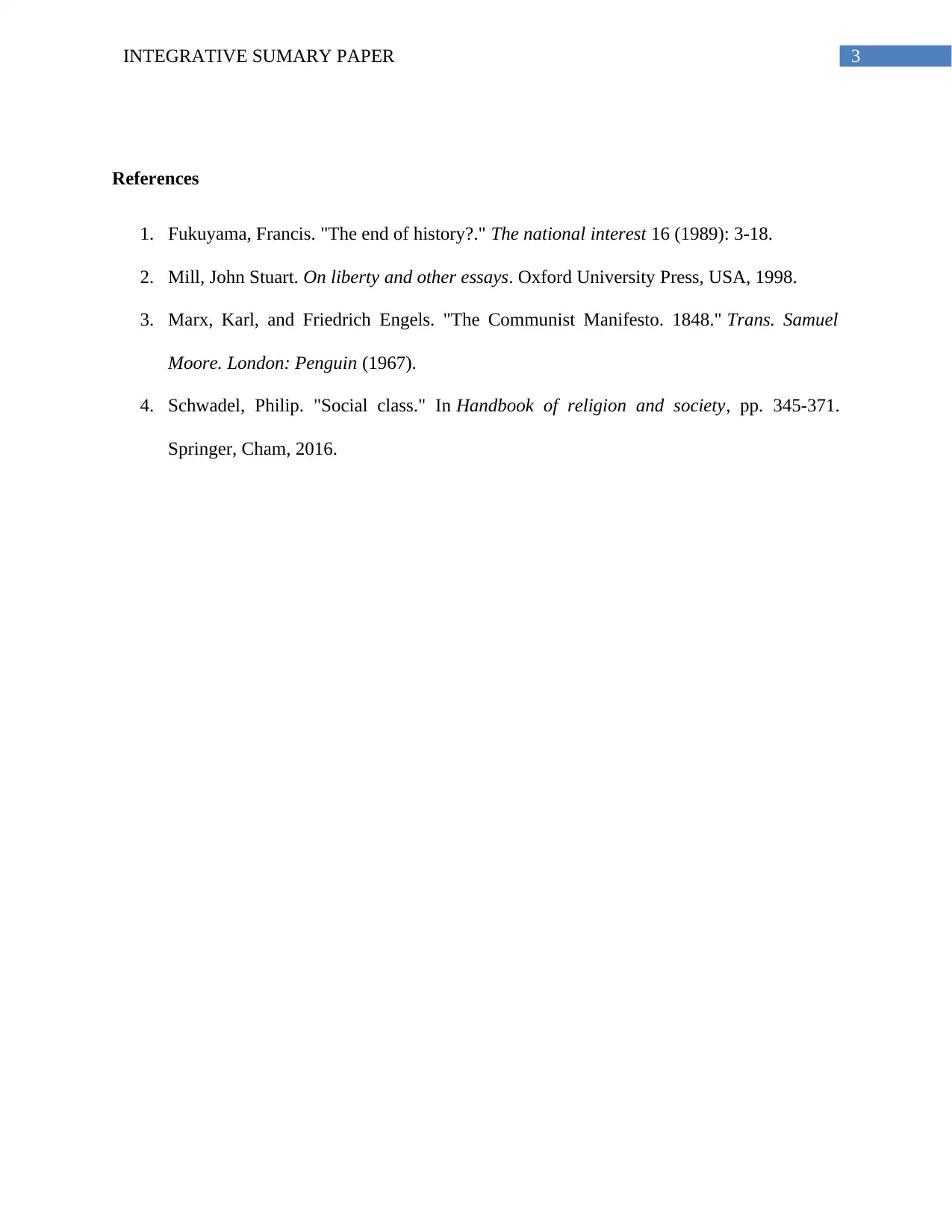
3INTEGRATIVE SUMARY PAPER
References
1. Fukuyama, Francis. "The end of history?." The national interest 16 (1989): 3-18.
2. Mill, John Stuart. On liberty and other essays. Oxford University Press, USA, 1998.
3. Marx, Karl, and Friedrich Engels. "The Communist Manifesto. 1848." Trans. Samuel
Moore. London: Penguin (1967).
4. Schwadel, Philip. "Social class." In Handbook of religion and society, pp. 345-371.
Springer, Cham, 2016.
References
1. Fukuyama, Francis. "The end of history?." The national interest 16 (1989): 3-18.
2. Mill, John Stuart. On liberty and other essays. Oxford University Press, USA, 1998.
3. Marx, Karl, and Friedrich Engels. "The Communist Manifesto. 1848." Trans. Samuel
Moore. London: Penguin (1967).
4. Schwadel, Philip. "Social class." In Handbook of religion and society, pp. 345-371.
Springer, Cham, 2016.
Paraphrase This Document
Need a fresh take? Get an instant paraphrase of this document with our AI Paraphraser
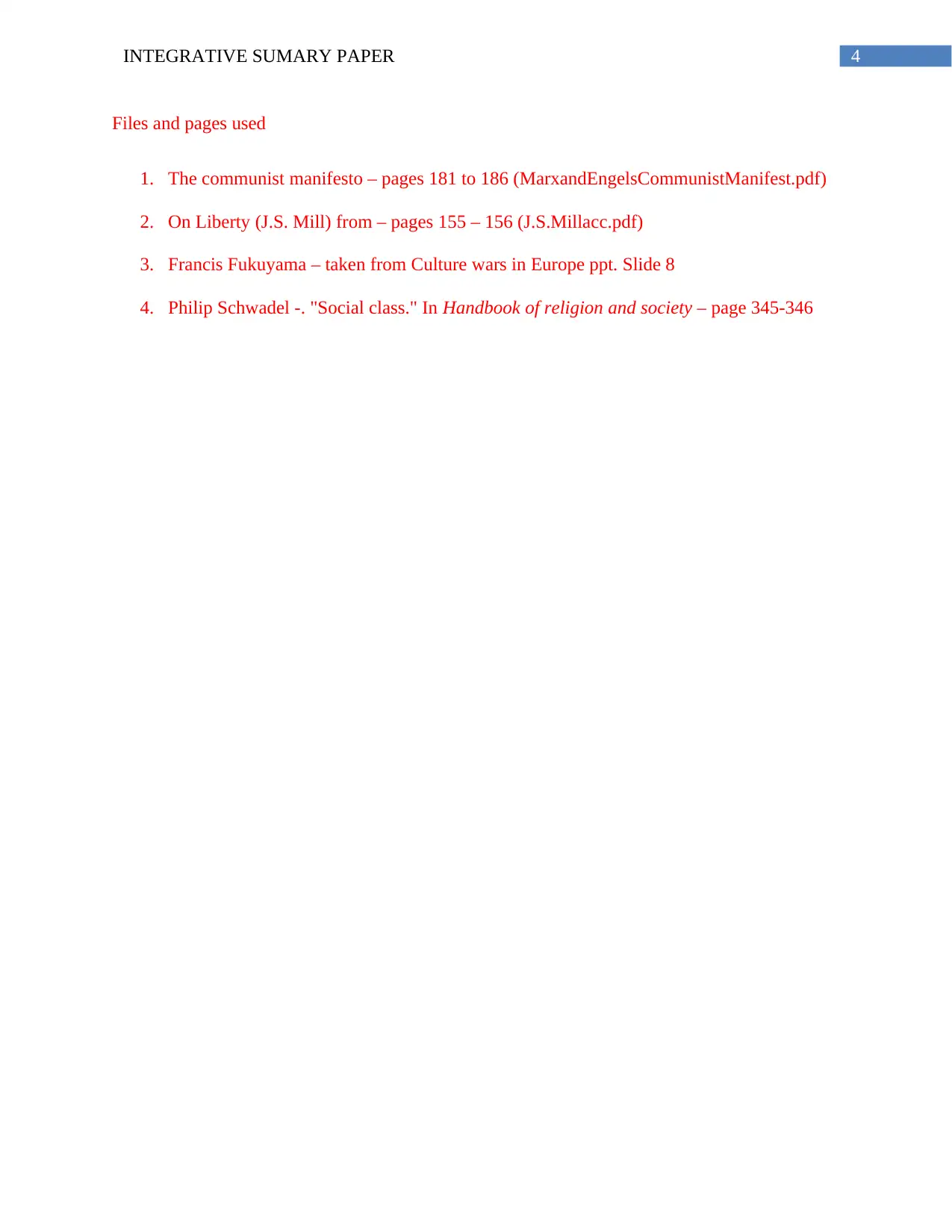
4INTEGRATIVE SUMARY PAPER
Files and pages used
1. The communist manifesto – pages 181 to 186 (MarxandEngelsCommunistManifest.pdf)
2. On Liberty (J.S. Mill) from – pages 155 – 156 (J.S.Millacc.pdf)
3. Francis Fukuyama – taken from Culture wars in Europe ppt. Slide 8
4. Philip Schwadel -. "Social class." In Handbook of religion and society – page 345-346
Files and pages used
1. The communist manifesto – pages 181 to 186 (MarxandEngelsCommunistManifest.pdf)
2. On Liberty (J.S. Mill) from – pages 155 – 156 (J.S.Millacc.pdf)
3. Francis Fukuyama – taken from Culture wars in Europe ppt. Slide 8
4. Philip Schwadel -. "Social class." In Handbook of religion and society – page 345-346
1 out of 5
Your All-in-One AI-Powered Toolkit for Academic Success.
+13062052269
info@desklib.com
Available 24*7 on WhatsApp / Email
![[object Object]](/_next/static/media/star-bottom.7253800d.svg)
Unlock your academic potential
Copyright © 2020–2026 A2Z Services. All Rights Reserved. Developed and managed by ZUCOL.

